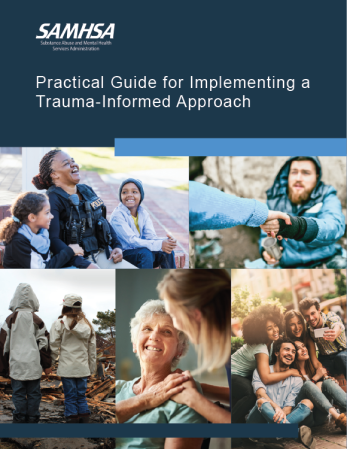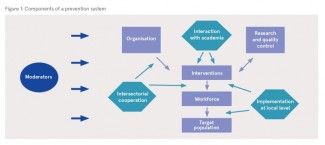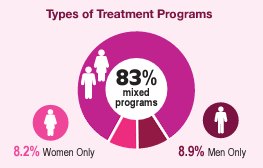Search
Quality Assurance
The application and integration of the best available research, clinical expertise, quality marks and patient preferences to ensure high-quality care in substance use disorders services.
Substance Use Monitoring and Surveillance: Challenges faced by LMICs
Substance use surveillance has emerged as a crucial public health strategy across Africa, particularly in light of the alarming rise in substance use among adolescents (1). This trend poses significant health risks that require a...
Building the Foundation of Evidence-Based Practice: A Guide to Evidence-Based Substance Use Prevention Resources
Evidence-based practice (EBP) serves as the foundation for effective prevention strategies, ensuring interventions, programmes, and policies are grounded in the best available scientific knowledge.
This guide presents a curated collection...
Quality Standards and Competencies for University and Higher Education Addiction Study Programs
BACKGROUND: Exponential growth of addiction specific services accelerated the need and pressure on professionalizing workforce. It is followed by the increasing number of university and higher education programs specifically focused on...
A rationale for an orientation towards systems of prevention
Prevention aligned with science and standards advocates for a person-focused rather than a drug-focused perspective when articulating responses and services. Such a perspective follows a narrative that early initiation to substance use is...
A Reflection on Prevention Systems: A European perspective
Prevention science over the past years has accumulated evidence on the effectiveness of drug prevention interventions (Sloboda et al. 2014). In Europe this improvement has been a consequence of priorities defined by EU drug strategies since...
The Power of Collaboration Project: Substance Use Disorder treatment for women
The Power of Collaboration is a joint project between ISSUP and the GWN. This initiative delves into three critical areas in substance use disorder (SUD) treatment for women:
-
MIND THE GAP: GLOBAL SURVEY EXAMINING ACCESS FOR SUBSTANCE...
Day 2, 14:00 - 15:30, ISSUP, Program for International Quality Assurance in Treatment - PIQAT
Presented at Thessaloniki 2024, on the 27th of June, 2024.
Moderator: Mr. Mariano Montenegro (⚑ Chile) - Colombo Plan Chile Office
Presentations:
Mariano Montenegro - Introduction to Treatment Quality Improvement (PIQAT / ICQ)
Anja...
Spanish Project of Best Practice Portal in Drug Demand Reduction and Behavioural Addictions
INTRODUCTION:
In Spain, the offer of prevention programmes is very varied and structured, but today the challenge remains how to put evidence into practice. European Commission define a best practice as “a relevant policy or intervention...
The Process of the Implementation of Quality Standards in Drug Prevention in Croatia: A Case Study
INTRODUCTION:
Prevention science and quality standards of drug prevention in the EU and in the world have developed in recent decades. Progress has been made in quality development in Croatia, but the experience of the process of improving...
Implementing Quality Measurement in the Field of Drug Treatment and Harm Reduction: A Case Study in Flanders
BACKGROUND:
Implementing quality measurement is still a challenge in the field of drug treatment and harm reduction. In this case study, we investigate which strategies can be used to enhance the implementation of a policy in which quality...
The ASPIRE Standards: Taking a Step Towards Quality Assurance in Drug Prevention in France – A Case Study
INTRODUCTION:
In the favourable political climate of the mid-2010s, the standards for Assessment & Selection of Prevention programmes Issued from the Review of EDPQS (ASPIRE) were developed to support project planning in drug prevention.
...The Implementation of Quality Standards (QS) at Coolmine Therapeutic Community
BACKGROUND:
Coolmine’s implementation of quality standards involves a period of change management, strategic planning, and national policy development.
METHODS:
A narrative case study focusing on national policy and internal strategic...
National Implementation of Quality Standards in Prevention and Treatment Services for Substance Use/ Addictions – A Case Study of Cyprus
INTRODUCTION:
The Cyprus National Addictions Authority (NAAC) is the main coordinating body for all matters related to licit and illicit substances as well as pathological gambling in Cyprus and it is responsible, inter alia, for the...
Substance Use Disorder Treatment Quality Standards in Lithuania 1992–2022: From Grassroots Initiatives to Nationwide Strategies
BACKGROUND:
The implementation of quality standards in the treatment of substance use disorders in Lithuania is not well documented in the literature.
AIMS:
To describe the process of the development of quality standards from grassroots...
Quality Assurance Policy in Harm Reduction Services in the Czech Republic: A Case Study of a National System
BACKGROUND:
In the field of harm reduction (HR), an established quality assurance system with implemented quality standards is rather rare in practice. Together with limited evidence in this area, this leads to an imbalance in the basic...
Implementation of Quality Standards in Drug Demand Reduction: Preliminary Findings from the FENIQS-EU Project
INTRODUCTION:
Quality Standards (QS) are an important priority in European drug policy, although the extent of their application remains unclear. The FENIQS-EU project (Further ENhancing the Implementation of Quality Standards in drug...
Pharmacotherapy Specialist Role in Rehabilitation Centres
Prescribed safer supply during dual public health emergencies: a qualitative study examining service providers perspectives on early implementation
Background: Over the past decade, drug-related overdoses have seen a significant rise both in North America and globally. The COVID-19 pandemic has further emphasised the urgent need for safer supply programs to replace unregulated...
Tools to implement measurement-based care (MBC) in the treatment of opioid use disorder (OUD): toward a consensus
Abstract
Background
The prevalence and associated overdose death rates from opioid use disorder (OUD) have dramatically increased in the last decade. Despite more available treatments than 20 years ago, treatment access and high...
Tobacco use and behaviour among South African adolescents and young adults: systematic review and meta-analysis
Abstract
Objective Tobacco use, particularly the initiation of smoking during adolescence and young adulthood, represents a significant public health concern in South Africa. This study aims to conduct a comprehensive review of published...
Share the Knowledge: ISSUP members can post in the Knowledge Share – Sign in or become a member








